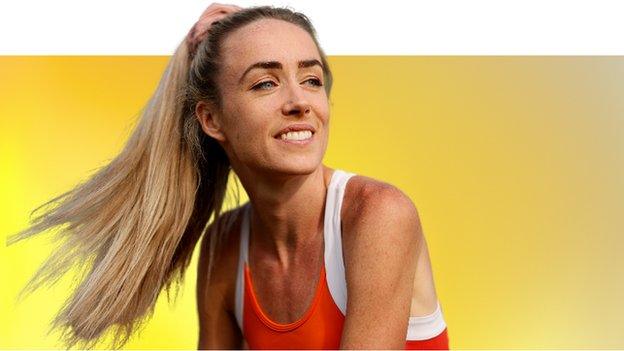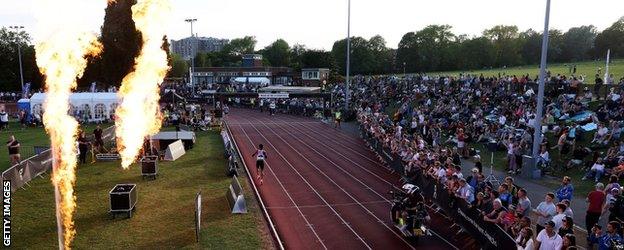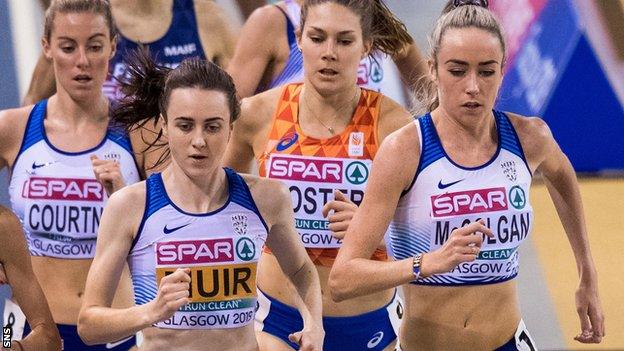Eilish McColgan column: Is athletics dying? Or does it just need reviving?
- Published

Briton McColgan is set to compete in the 5,000m and 10,000m at the World Athletics Championships, which start on Friday
World Athletics Championship | |
|---|---|
Venue: Eugene, Portland, United States Dates: Friday 15 July - Sunday 24 July | |
Coverage: Follow live across the BBC Sport website & app |
Is athletics a dying sport? Prize money continues to decline. Some meets are held in half-empty stadiums and I feel coverage outside events such as this month's World Championships, the Commonwealth Games and Europeans is scant.
Despite the BBC showing each Diamond League event on TV, Red Button or the iPlayer, the season is becoming harder to follow in the media. Events are being removed from those meets to make the schedule more "snappy". And long-distance races like mine are being deemed "too boring".
There's an assumption the public don't have the attention span to watch runners compete for anything longer than four minutes. That's the same public who will happily watch cricket, darts or a Formula 1 race for hours and hours.
People love running. You only need to see how many do parkruns every weekend. Thousands upon thousands of potential spectators run 5ks, 10ks, half marathons and marathons yet the vast majority won't really follow the elite end of athletics.
But why is that? I can't imagine many Sunday league footballers don't watch the Premier League. Maybe we need to ask those individuals directly why they don't engage with the elite side of a sport they love.
'Athletes are like horses, so should fans be able to bet?'
I'm wary of pointing out our sport's failings and not offering solutions. That's what I see time and again on social media. But recently I asked on Twitter what we can do to improve things, and was inundated with responses.
One of GB's top track athletes sent me a voice note in which he said: "We are essentially horses. Fans should be able to bet on us."
He is spot on. Maybe we need to give people a reason to be invested in the competition. Sure, it runs the risk of corruption, but just cap the bets so no-one can make or lose a crazy amount. Just enough to make it a bit of fun.

Are fire breathers and running through beer tents, like at Night of The 10,000m PBs one solution?
Perhaps it's not the events, but how they are showcased? Look at Highgate Harriers' Night of The 10,000m PBs, which has turned UK distance running on the track into a celebration.
Just last month, more than 1,000 people crammed on to a tiny, unassuming track in London. There were fire breathers, dancers, magicians and plenty of beer. Spectators could bet and get so involved that they were encroaching on to lane three of the track. The competitors even run through a beer tent! On paper, it sounds like madness but in person, it's a spectacle.
As a sport, we need more of this. So why not continue to take pole vault to the streets, and showcase the shot put in the city centre? We could separate events into specific evenings - distance, sprint, throws, jumps. Or we could make meets a day out for families, with fun runs, or junior and masters events.
Or could we build more professional teams, backed by the big sporting brands? Just like we've seen in the United States. Folk can follow their favourite teams throughout the season and purchase the kit.
'We need to tell our athletes' stories all year'
Whatever the specific solutions, athletics needs to be marketed better.
Most people are unaware when events are happening outside of major championships. I had one amateur marathon runner tell me on Instagram that he'd love to watch more athletics, but never knows when it's on.
We need to be telling the stories of our top athletes all year round. Showcasing all the events they compete in, rather than just once every four years. That's what Formula 1: Drive to Survive has done. Why can't athletics do something like it?
What really goes on in the GB squad? How do they react to their contract being cut? How do they deal with injuries? How do they balance becoming a mum and still keeping their identity as an athlete? How does drug testing work? That is stuff that is rarely seen but I believe it's the only way we can engage the next generation of viewers.
It doesn't even have to be a full-scale production. The governing bodies could hire a few videographers to follow some of the top athletes and upload weekly videos to social media. It would help people to see the human behind the athlete.
Live TV coverage is important, too. If you don't show it, people can't see it. I just don't believe there isn't enough time, or an appetite, for live sport on mainstream channels.
BBC Sport showed the British Championships on the Red Button and online - but for me it should be on a main network channel as well. It also needs to be promoted better, be easier to find, and we need the competition timetable, start lists and results.
Even as an athletics nut, I struggle to find all that online, so can you imagine how difficult it is for Joe Bloggs?
'Stop the negativity & play up positives'
The media play a huge role in all of this. Despite the UK having some of the best female athletes in the world, none are household names. Dina Asher-Smith, Katarina Johnson-Thompson, Holly Bradshaw, Laura Muir... their performances should be on the main sports pages and channels.
But when athletics is covered prominently, it's usually based in negativity. I'm generally only asked for an interview when something bad has happened - my parents are going through a messy divorce; my house is broken into; I'm viciously trolled online.
Last year, I broke Paula Radcliffe's long-standing British 5,000m record, but no-one was interested. Yet a week or so later, journalists were hounding me for a comment on how it felt to be body-shamed online.
It's a discussion that comes up frequently among athletes. It's never about performance, unless it's to report a bad one.

Why are performances like those of Laura Muir, second left, not celebrated rather than critiqued?
I remember joking with Laura Muir when she was fourth in a Diamond League race behind three of the fastest women ever. The times were ridiculous and she had one of the best runs of her career but we knew the reports wouldn't reflect that.
We joked about what it would say. 'Muir way off the front' or 'Muir not up to pace'. We burst out laughing when they started to come through because it was something like 'disappointing run and off the podium'.
That negative slant becomes seen as the reality but Laura ran a British record so why aren't the reports positive? If they were, we might inspire youngsters to get into athletics.
And there is no better time for the sport to do that. This summer sees not one, not two, but three major championships take place. All of which will be televised live on the BBC and in which we have genuine medal contenders.
We already have some spectacular road races in the UK. Prestigious ones that are bucket-list worthy. The London Marathon. The Great North Run. People sign up in their droves to get a spot on those start lines.
And during the pandemic, we had more newbie runners than ever before. How do we tap in to that potential market? How do we connect the dots?
Athletics is a global sport with so much potential. Every nation is represented. Everyone can see someone like them competing. From the hammer throw to the marathon, there's an event for everyone no matter what size or shape you are. How many sports can say that?
We need to start showcasing our amazing and unique sport. Reporting the good stories, celebrating the achievements and properly presenting just how incredible our sport is to the world. Because athletics ain't dead.